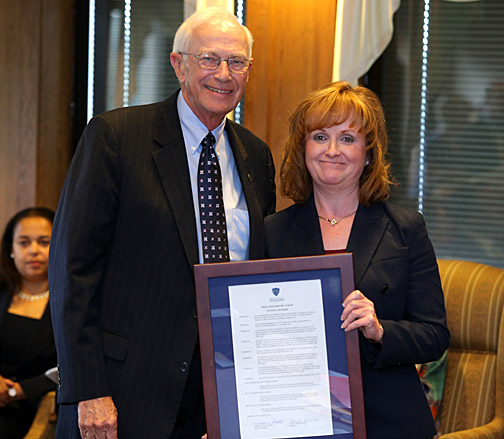The UT Board of Trustees last week approved a fiscal year 2014 budget that University leaders say puts students first.
The $775.2 million budget includes no increases in undergraduate tuition, room and board, or general fees, which UT committed to in November very early in the budget process as part of a pledge to keep higher education affordable.

William Koester, chair of the board, presented trustee Susan Gilmore with a proclamation thanking her for her service. Her term and Koester’s expire at the end of the month. President Lloyd Jacobs presented Koester with a proclamation as well.
Jacobs said UT students will benefit from more experienced professors in the classroom, given the new faculty workload requirements. At the same time, class size has been held stable with a student-to-faculty ratio of 19 to one.
The only personnel cost increases are for additional academic advisers and new success coaches who assist students through their college experience.
In recent years, UT has moved $12 million from backroom functions to the classroom. The 2014 budget continues such adjustments by deferring funding for some facilities and equipment upkeep so that money can be used for academic operations.
The combined $775.2 million budget consists of a $498.8 million, break-even budget for academic operations and $276.4 million for the clinical enterprise that includes a 6.5 percent operating margin.
Trustees also approved the adoption of remediation-free standards established by Ohio’s public college and university presidents. The standards use ACT and SAT sub-scores to determine if a student needs remediation.
By the standards, students with an English score of 18 or higher on the ACT and SAT scores of 430 or higher in writing and 450 or higher in critical reading do not need remedial education in that subject. Students with a reading sub-score of 21 or higher on the ACT and 450 or higher on the SAT and mathematics sub-scores of 22 or higher on the ACT and 520 or higher on the SAT also do not need remediation in those subjects.
Dr. Scott Scarborough, provost and executive vice president for academic affairs, shared with the trustees the various tools used by the University to improve the college readiness of students; these include the Aleks Learning System and the MyCompLab system.
Dr. Shanda Gore, associate vice president for equity, diversity and community engagement, also gave a report on the Campus Climate Faculty and Staff Survey taken every two years to assess the climate of the University. The next survey will be in 2014.
Two board members were honored as their terms on the board expire June 30. William C. Koester, who most recently served as board chair, was appointed to the UT Board of Trustees in 2004, and Susan E. Gilmore was appointed in 2004 to the Medical University of Ohio Board of Trustees. Beginning July 1, Joseph H. Zerbey IV will serve as chair, and Sharon Speyer will serve as vice chair.